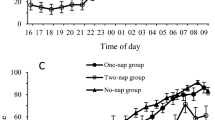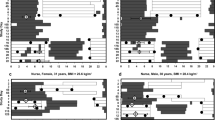Summary
Daytime napping and its effects on 145 female shiftworkers were studied by comparing the individual characteristics, alertness, and short-term memory performance of subjects who took or did not take naps. Of the subjects 56% (n = 82) took a nap before a night shift and 21% (n = 30) after a morning shift. After a morning shift, napping was more frequent among evening types and subjects living alone (not married). Before a night shift, daytime napping was not connected to individual characteristics, but the total sleep time of nappers during the preceding night was shorter than that of non-nappers. At 10.00 and at 04.00–08.00, at the end of the night shift, nappers were significantly more alert than subjects who had not taken naps. The length and timing of the daytime nap did not correlate to either alertness or performance during the following night. In a questionnaire, nappers before a night shift had less sleep disturbances than non-nappers.
Similar content being viewed by others
References
Åkerstedt TB (1988) Sleepiness as a consequence of shiftwork. Sleep 11:17–34
Åkerstedt TB, Torsvall L (1985) Napping in shift work. Sleep 8:105–109
Bertelson AD (1979) Effects of napping and bedrest on performance and mood. Ph D dissertation. Ohio State University, pp 79–81
Dinges DF, Orne MT, Orne EC, Evans FJ (1981) Behavioral patterns in habitual nappers. Sleep Res 10:136
Eysenck HJ (1958) A short questionnaire for the measurement of two dimensions of personality. J Appl Psychol 42:14–17
Folkard A, Knauth P, Monk TH (1976) The effect of memory load on the circadian variation in performance efficiency under a rapidly rotating shift system. Ergonomics 19:479–488
Gillberg M (1985) Effects of naps on performance. In: Folkard S, Monk TH (eds) Hour of work. Temporal factors in work scheduling. John Wiley & Sons Ltd, Chichester New York Bristone, pp 77–86
Härmä M, Ilmarinen J, Knauth P, Rutenfranz J, Hänninen O (1988) Physical training intervention in female shiftworkers: I. The effects of intervention on fitness, fatigue, sleep and psychosomatic symptoms. Ergonomics 31:39–50
Kleitman N (1963) Sleep and wakefulness. University of Chicago Press, Chicago
Minors DS, Waterhouse JM (1987) The role of naps in alleviating sleepiness during an irregular sleep-wake schedule. Ergonomics 30:1261–1273
Naitoh P (1981) Circadian cycles and restorative power of naps. In: Johnson LC, Tepas DI, Colquhoun WP, Colligan MJ (eds) Biological rhythms, sleep and shift work. Spectrum, New York, pp 553–580
Rutenfranz J, Colquhoun WP, Knauth P, Ghata JN (1977) Biomedical and psychosocial aspects of shiftwork. Scand J Work Environ Health 3:165–182
Taub JM, Tanguay PE (1977) Effects of afternoon naps on physiological variables performance and self-reported activation. Biol Psychol 5:191–210
Taub JM, Tangnay AE, Clarkson D (1976) Effects of daytime naps on performance and mood in a college student population. Abnorm Psychol 85:210–217
Tepas DI (1982) Shiftworker sleep strategies. J Human Ergol 11:325–336
Torsvall L, Akerstedt T (1980) A diurnal type scale (construction, consistency and validation in shift work). Scand J Work Environ Health 6:283–290
Webb WB (1987) The proximal effets of two and four hour naps within extended performance without sleep. Psychophysiology 24:426–429
Author information
Authors and Affiliations
Rights and permissions
About this article
Cite this article
Härmä, M., Knauth, P. & Ilmarinen, J. Daytime napping and its effects on alertness and short-term memory performance in shiftworkers. Int. Arch Occup Environ Heath 61, 341–345 (1989). https://doi.org/10.1007/BF00409390
Received:
Accepted:
Issue Date:
DOI: https://doi.org/10.1007/BF00409390




